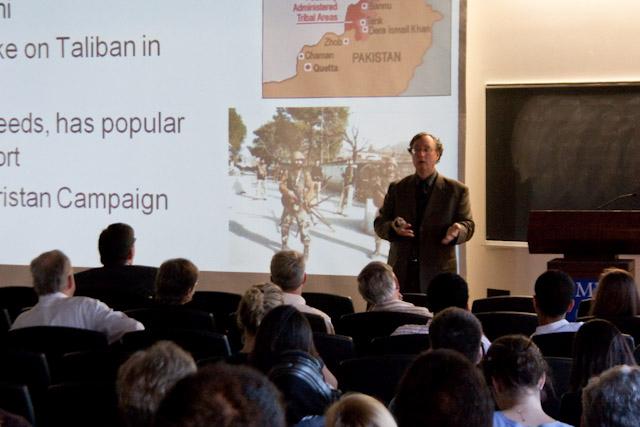
Dr. Juan Cole speaks on the relationship between the Pakistani government and the U.S. since Sept. 11. (Spencer J Eggers/The Daily Campus)
Dr. Juan Cole, director of the Center for South Asian Studies at the University of Michigan, discussed the relationship between the Pakistani government and the United States since Sept. 11 during the Scott-Hawkins Lecture Monday night.
“Pakistan is important because of the struggle in Afghanistan. But we often oversimplify the issue,” Cole said.
The tribal region between Afghanistan and Pakistan is one of real contention, according to Cole.
“We often think that the Taliban proper is the only group we are fighting against,” Cole said. “In reality, there are four groups in the region.”
Two of the groups in the border region were created by the United States during the Cold War.
In an effort to fight the Soviet Union in Afghanistan and stop the spread of communism, the American government gave billions of dollars to mujahideen or “freedom fighters.”
“The Jalaluddin Haqqani group based out of Waziristan and the Gulbadin Hikmatyar in the Eastern Pashtun provinces are also fighting American troops,” Cole said.
For centuries, nations like Great Britain and the Soviet Union have tried to control the borderlands.
“People fail to realize how multicultural and diverse the region is,” Cole said. “Even the Pakistani government classifies the region as administratively inaccessible.”
Systemic problems in Pakistan’s infrastructure have also hampered the fight against insurgency forces.
“Pakistan’s military is paranoid about Indian agents being everywhere,” Cole said. “The intelligence community is a
state within a state.”
Pakistan’s ailing economy is another source of concern.
Five percent of the population controls 66 percent of the land.
It is consistently named a failed state by international organizations.
“Egalitarianism is a recruiting tool used by the Taliban,” Cole said. “The crushing poverty in Pakistan has great political implications.”
The rural crisis in Pakistan is the main source of regional instability.
Autonomous politics in the borderlands do not help.
“The United States cannot hope to control an area that is confined by artificial borders drawn in 1892 by the British,” Cole said. Cole’s lecture, hosted by the Asian studies department and the Tower Center for Political Studies, underlined the growing problems in dealing with Pakistan’s inability to control forces within its borders.
“The United States must weigh these systemic problems before developing a new policy with Pakistan,” Kevin Matejka, an international area studies student, said.








